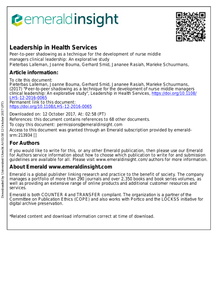The purpose of this study was to explore the experiences and impact of peer-to-peer shadowing as a technique to develop nurse middle managers’ clinical leadership practices. A qualitative descriptive study was conducted to gain insight into the experiences of nurse middle managers using semi-structured interviews. Data were analysed into codes using constant comparison and similar codes were grouped under sub-themes and then into four broader themes. Peer-to-peer shadowing facilitates collective reflection-in-action and enhances an “investigate stance” while acting. Nurse middle managers begin to curb the caring disposition that unreflectively urges them to act, to answer the call for help in the here and now, focus on ad hoc “doings”, and make quick judgements. Seeing a shadowee act produces, via a process of social comparison, a behavioural repertoire of postponing reactions and refraining from judging. Balancing the act of stepping in and doing something or just observing as well as giving or withholding feedback are important practices that are difficult to develop.
DOCUMENT

The rising global demand for district nursing care necessitates effective strategies to support evidence-based decision-making. Despite the extensive development of nursing guidelines, adherence by district nursing teams remains suboptimal, revealing a gap between guideline development and daily practice. The Learning And Reflection for Nurses (LEARN) programme aims to bridge this gap by enhancing guideline use and fostering a learning attitude among district nursing teams. This protocol outlines the programme’s development, components and evaluation approach.
LINK
Some nurses are responding rebelliously to the changing healthcare landscape by challenging the status quo and deviating from suboptimal practices, professional norms, and organizational rules. While some view rebel nurse leadership as challenging traditional structures to improve patient care, others see it as disruptive and harmful. These diverging opinions create dilemmas for nurses and nurse managers in daily practice. To understand the context, dilemmas, and interactions in rebel nurse leadership, we conducted a multiple case study in two Dutch hospitals. We delved into the mundane practices to expand the concept of leadership-as-practice. By shadowing rebel nurse practices, we identified three typical leadership practices which present the most common “lived” experiences and dilemmas of nurses and nurse managers. Overall, we noticed that deviating acts were more often quick fixes rather than sustainable changes. Our research points to what is needed to change the status quo in a sustainable manner. To change unworkable practices, nurses need to share their experienced dilemmas with their managers. In addition, nurse managers must build relationships with other nurses, value different perspectives, and support experimenting to promote collective learning.
MULTIFILE
